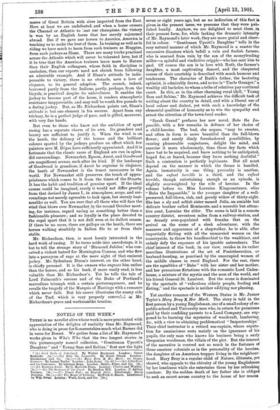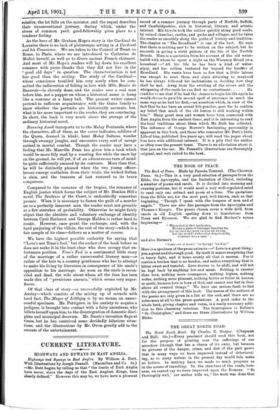NOVELS OF THE WEEK.* THERE is no novelist alive whose
work is more penetrated with appreciation of the delights of rusticity than Mr. Raymond, who is doing in prose for Somersetshire much what Barnes did in verse for Dorset. We gather from a list of Mr. Raymond's works given in Who's Who that the two longest stories in this picturesquely named collection, "Gentleman 1Jpcott's Daughter " and "Young Sam and Sabina," first saw the light • (1.) Good Souls of Ciderland. By Walter Raymond. London : Grant Richards. [6s.]—(2.) Baba the Impossible. By Sarah Grand. London : Huh:4411mm and Co. [6.9.]—(3.) Mary Bray )i Her Murk: an Oregon Romance. By denser Tayler. London: John Long. 5s. Gd.]—(4.) A Cardinal and his Conscience. By Graham Hope. London: Smith, Elder, and Co. [6s. j —(5.) Running Amok. By G. Manville Fenn. London : Chatto and Windus. [Gs.]—(6.) The Sentence of the Court. By Ideation Hill. London C. Arthur Pearson. 168.3—(7.) Time's Fool an English Idyll. Edinburgh: David Douglas. [64.1—(8.) The Mayor of Littlejoy. By Fred. C. Smale. Illustrated by Will. Owen. London: Ward, Lock, and Co.' [68.] seven or eight years ago, but as no indication of this fact is given in the present issue, we presume that they were pub- lished locally. Anyhow, we are delighted to meet. them in their present form, for, while lacking the dramatic intensity of Mr. Raymond's later work, they are more gbnia.1 and cheer. ful in colour. " clentlenran Upcott's Daughter" tells in the easy natural manner of which Mr. Raymond is a master the successive disasters which befell a vain and foolish farmer, who is rescued from ruin by the son of the moneylending miller—a spiteful and vindictive cripple—who has sent him to gaol. Of course the son is in love with Ruth, the farmer's daughter, a most captivating damsel, and the chequered course of their courtship is described with much humour and tenderness. The character of Ruth's father, the hectoring optimist, is admirably drawn, and so too is" Uncle Granger," a wealthy old bachelor, to whom a tribe of relatives pay continual court. In this, as in the other charming rural idyll," Young Sam and Sabina," Mr. Raymond achieves the difficult task of writing about the country in detail, and with a liberal use of local colour and dialect, yet with such a knowledge of the elemental qualities of humanity as to win the sympathy and arrest the attention of the town-bred reader.
"Sarah Grand" prefaces her new novel, Babe the Im- possible, with a few remarks in defence of her -choice of a child-heroine. The bud, she argues, "may be sweeter, and often in form is more beautiful than the full-blown flower; and surely dimly foreshadowed possibilities, by causing pleasurable conjectures, delight the mind, and exercise it more wholesomely, than those dry facts which have but to be acquired, and leave nothing to be anticipated, hoped for, or feared, because they leave nothing doubtful." Such a, contention is perfectly legitimate. But all must depend on the manner in which the theme is handled. Again, immaturity is one thing: "precooity. is - another, and the enfant terrible is a third, and the enfant terrible, though entertaining enough as an episode, is slightly overweighted by the role of heroine. In- the volume before us, Miss Lorraine Kingconstance, alias " Babs the Impossible," is the younger daughter of a well- preserved, full-blown, rich, and greedy widow of thirty-eight. She has a sly and selfish sister named Julia, an amiable but delicate brother called Montacute, and a neurotic but attrac- tive aunt, Lorraine the elder. The scene is laid in a remote• country district, seventeen miles from a railway-station, and so densely over-populated with females that on the arrival on the scene of a sleek adventurer, with the manners and appearance of a shopwalker, he is able, after impartially flirting with all the unmarried women on the countryside, to throw his handkerchief to the wealthiest, and calmly defy the exposure of his ignoble antecedents. The chief interest of the book, in our view, resides in its rather merciless illustrations of the art of Posiothereutics, or husband-hunting, as practised by the unoccupied women of the middle classes in rural England. For the rest, there are the squabbles of " Baba " with her sister and her mother, and her precocious flirtations with the romantic Lord Caden- house, a mixture of the mystic and the man of the world, and his friend General St. Lambert. But the scene is dominated by the spectacle of "ridiculous elderly people, feeding and flirting," and the spectacle is neither edifying nor pleasing.
Yet another romance of the Western States is Mr. Jenner Tayler's Mary Bray X Her Mark. The story is told in the first person by a young Englishman, one of a small colony of ex- public-school and University men who, in return for premiums paid by their confiding parents to a Land Company, are sup- posed to be learning the mysteries of woodcraft, lumbering, &c., with a view to obtaining problematical " Inspectorships." Their chief instructor is a retired sea-captain, whose rephta- tion for omniscience rests mainly, on the ignorance of his pupils, the only man who knows his business being a surly Oregonian woodsman, the villain of the plot. But the interest of the narrative is centred not so much in the fortunes of these amateur colonials as in the personality of the heroine, the daughter of an American trapper living in the neighbour- hood. Mary Bray is a regular child of Nature, illiterate,-yet shrewd, who appeals to the chivalry of the young Englishmen by her loneliness while she entertains them by her refreshing candour. By the sudden death of her father she is obliged to seek an escort across country to the house of her neares relative, the lot falls on the narrator, and the sequel describes their unconventional jottney, during which, under the stress of common peril, good-fellowship gives place to a tenderer feeling.
As the hero of Mr. Grahatg,Hope's story is the Cardinal de Lorraine there is no lack of picturesque setting in A Cardinal and his Conscience. We are taken to the Council of Trent, to Rome, to Paris, where we are introduced to Catherine de Medici herself, as well as to divers ancient French chateaux. And most of Mr. Hope's readers will lay down his excellent romance with pious thanks that they did not live in the " good old days" in question. The characterisation is not less good than the setting. The study of the Cardinal— whose conscience troubled him very sorely when he com- mitted the indiscretion of falling in love with Mlle. Renee de Beauvoir—is cleverly done, and• the reader sees a real man before him, not a puppet on whom a historical name is hung like a costume at a fancy ball. The present writer cannot pretend to sufficient acquaintance with the Guise family to know whether the portraits are historically accurate, but, what is far more important to the reader, they are convincing. In short, the book is very much above the average of the ordinary historical novel.
Running Amok transports vs to the Malay Peninsula, where the characters, all of them, as the cover indicates, soldiers of the Queen, dressed in khaki, hunt Malay Sultans, wander through swampy jungles, and encounter every sort of savage animal in mortal combat. Though the reader may have a feeling that Mr. Manville Fenn has given him a book which would be more fitly read by a. roasting fire while the snow lay on the ground, he will yet, if of an adventurous turn of mind. be quite sufficiently amused by its contents. More than that, he will be distinctly pleased when the two young officer- heroes emerge scatheless from their trials, the wicked Sultan is slain, and the treasure of loot restored to its brave conquerors.
Compared to the romance of the tropics, the romance of English justice which forms the subject of Mr. Headon Hill's novel, The Sentence of the -Cowl; is undoubtedly somewhat prosaic. When it is necessary to fasten the guilt of a murder on to a perfectly innocent man the reader must not grumble at a few stretches of probability. Otherwise he might fairly object that the absolute and voluntary exchange of identity between Cyril Batlinrst and George Malden is rather hard to credit. However, once grant the exchange, and, with the hard perjuring of the villain, the rest of the story—which is a fair sample of its class—follows as a matter of course.
• We have the highest possible authority for saying that "Love's not Time's fool?' but the author of the book before us does not make it in the least clear who does occupy that un- fortunate position. Time's .Fool is a sentimental little story of the marriage of a rather unsuccessful literary man—or rather of the heir to a country gentleman who has to attempt to make his living by literature in consequence of his uncle's opposition to his marriage. As soon as the uncle is recon- ciled and dead, the wife about whom all the fuss has been made dies of "pernicious anmmia," which seems very super- fiuous.
Of that class of story—so successfully exploited by Mr. Anstey—which consists of the mixing up of miracle with hard fact, The Mayor of Littlejoy is by no means an unsuc- cessful specimen. Mr. Pettigrew, in his anxiety to acquire a pedigree, is brought into contact with a fairy ancestress, who billets herself upon him, to the disintegration of domestic disci- pline and municipal decorum. Mr. Smale's invention flags at times, but he has contrived some decidedly hilarious situa- tions, and the illustrations by Mr. Owen greatly add to the success of the entertainment.







































 Previous page
Previous page